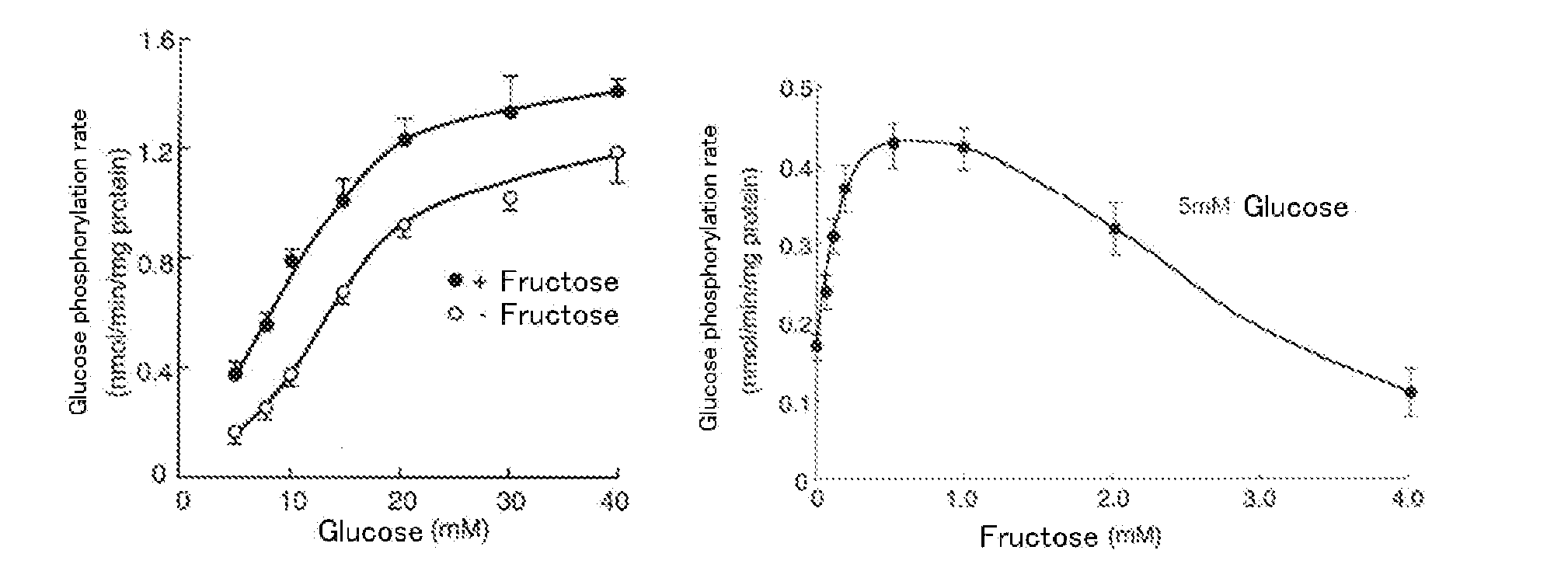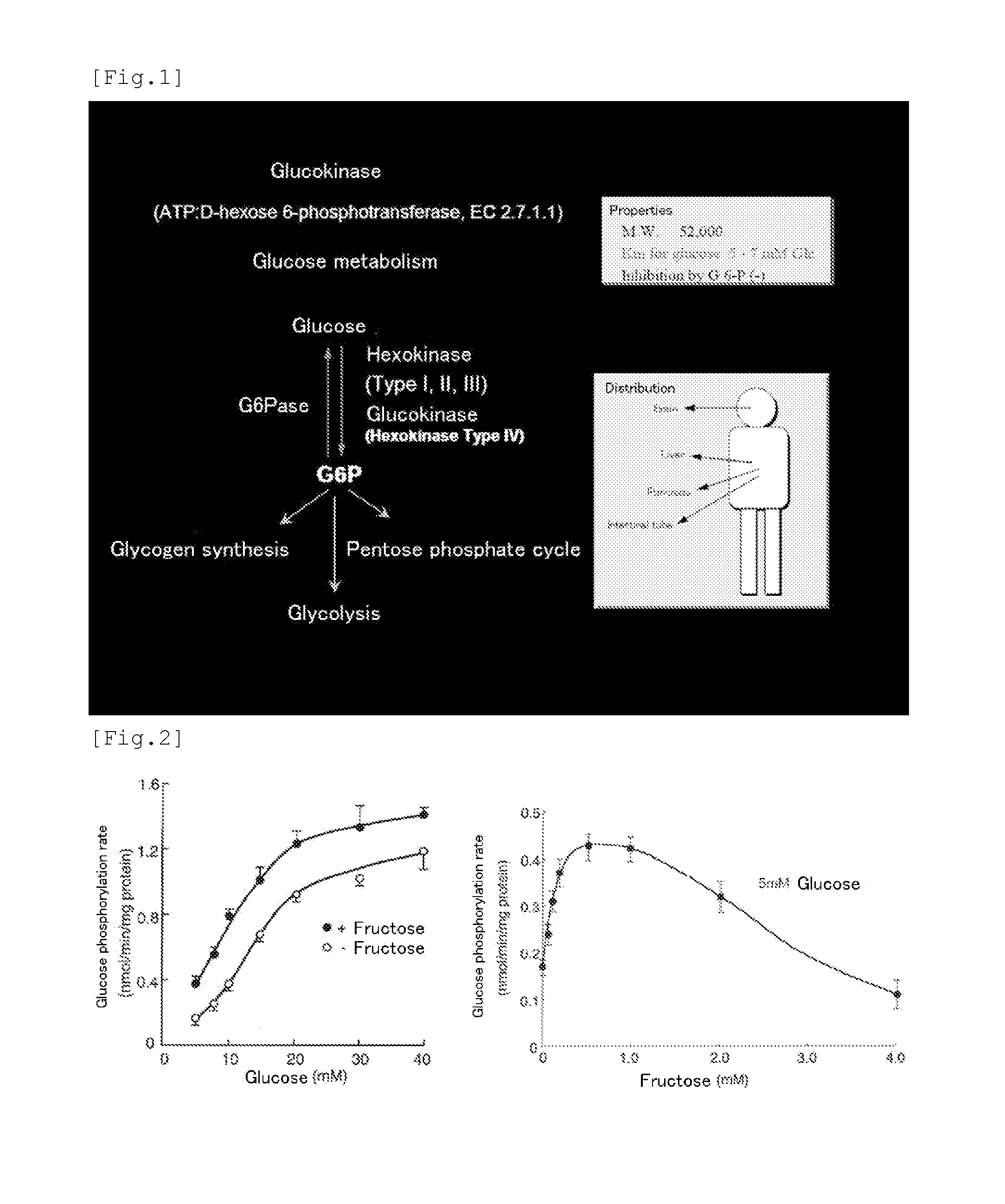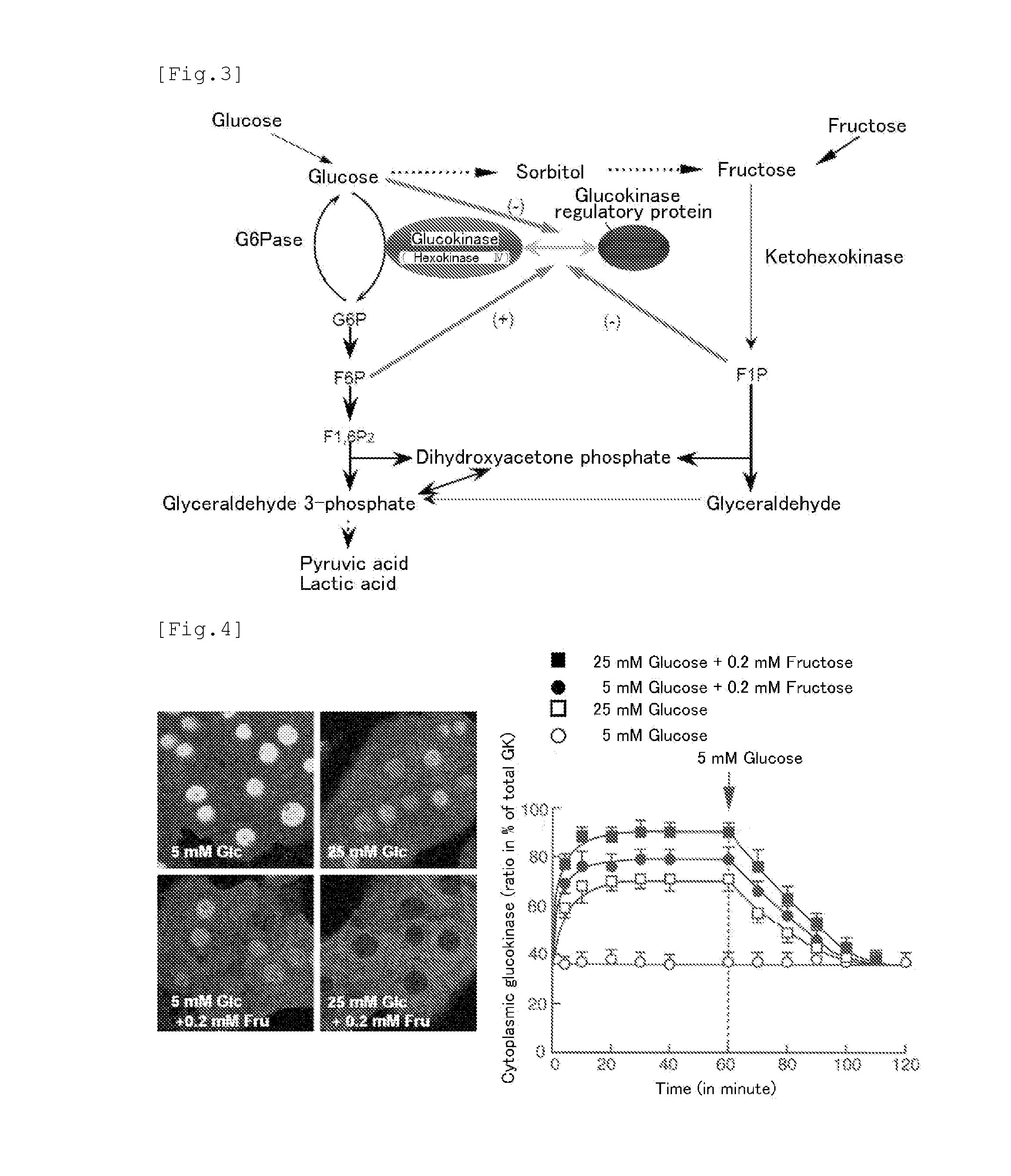Utilization of the function of rare sugar as promoter for the migration of glucokinase from nucleus to cytoplasm
a technology of glucokinase and rare sugar, which is applied in the direction of biocide, drug composition, metabolic disorder, etc., can solve the problems of deteriorating sugar utilization in liver, affecting the synthesis of gluconeogenesis, and increasing blood glucose levels after meals, so as to prevent the onset of disordered conditions
- Summary
- Abstract
- Description
- Claims
- Application Information
AI Technical Summary
Benefits of technology
Problems solved by technology
Method used
Image
Examples
example 1
[0143]Liver is an important organ for the maintenance of the homeostasis of blood glucose. One of the rate limiting enzymes of glycolysis in the sugar metabolism in liver is glucokinase (EC 2.7.1.1) existing in the inactive type via the binding to the glucokinase regulatory protein in the cell nucleus during fasting. Due to the increase of extracellular D-glucose concentration and the existence of D-fructose at a low concentration, glucokinase is dissociated from the glucokinase regulatory protein and is transferred from the nucleus to the cytoplasm. In such manner, glucokinase promotes D-glucose metabolism. Glucokinase transfer between the nucleus and the cytoplasm is regulated by hormones. Insulin transfers glucokinase from the nucleus to the cytoplasm while glucagon transfers glucokinase from the cytoplasm to the nucleus.
[0144]In recent years, reports have bee issued about a glucokinase-activating agent with a hypoglycemic action via the enhancement of glucokinase activity. Addit...
example 2
[0155]Experiments were carried out to verify whether or not glucokinase transfer from nucleus to cytoplasm as observed in the culture cell occurred even in animal experiments.
[0156]FIG. 14 shows the protocols. Male Wistar rats starved overnight were orally given D-glucose, D-psicose, D-fructose and a mixture of D-psicose and D-fructose at 1: 3, at individual doses of 2 g / kg. Thirty minutes later, the rats were subjected to perfusion and fixing with 4% para-formaldehyde under anesthesia, from which liver was immediately resected to prepare frozen sections. The distribution of glucokinase in nucleus and cytoplasm was analyzed with the fluorescence antibody method using an anti-glucokinase antibody. Simultaneously, blood was drawn out from the tail vein and the portal vein, to assay blood glucose levels.
[Results and Discussion]
[0157]FIG. 15 shows the results.
[0158]In the control (starved overnight), glucokinase mostly exists in the hepatocyte nucleus. When D-psico...
example 3
[0162]For the purpose of mimicking general states of meals, rats orally given with a given amount of D-glucose were simultaneously given D-psicose or D-fructose or a mixture of D-psicose and D-fructose at an amount 1 / 10-fold the given amount of D-glucose, to certify whether or not glucokinase transfer from nucleus to cytoplasm emerged experimentally.
[0163]FIG. 16 shows the protocols. Male Wistar rats starved overnight were given 2 g / kg D-glucose orally. Simultaneously, 0.2 g / kg D-psicose, D-fructose or a mixture of D-psicose and D-fructose at 1: 3 were given orally. Thirty minutes later, the rats were perfused and fixed with 4% para-formaldehyde under anesthesia, from which liver was immediately resected to prepare frozen sections. The distribution of glucokinase in the nucleus and the cytoplasm was analyzed with the fluorescence antibody method using an anti-glucokinase antibody. Simultaneously, blood was drawn out from the tail vein and the portal vein, to as...
PUM
| Property | Measurement | Unit |
|---|---|---|
| body weight | aaaaa | aaaaa |
| body weight | aaaaa | aaaaa |
| body weight | aaaaa | aaaaa |
Abstract
Description
Claims
Application Information
 Login to View More
Login to View More - R&D
- Intellectual Property
- Life Sciences
- Materials
- Tech Scout
- Unparalleled Data Quality
- Higher Quality Content
- 60% Fewer Hallucinations
Browse by: Latest US Patents, China's latest patents, Technical Efficacy Thesaurus, Application Domain, Technology Topic, Popular Technical Reports.
© 2025 PatSnap. All rights reserved.Legal|Privacy policy|Modern Slavery Act Transparency Statement|Sitemap|About US| Contact US: help@patsnap.com



